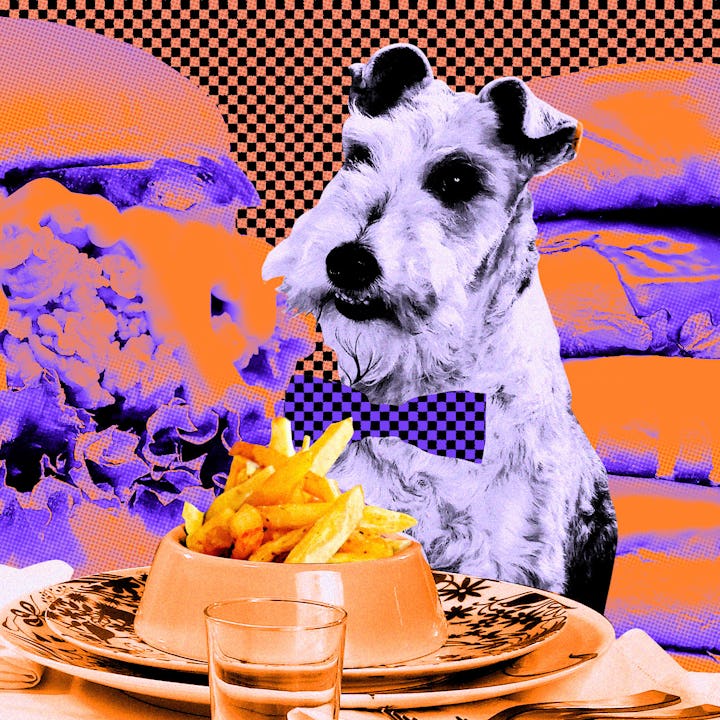Should Dogs Eat Human Food? A Vet Unpacks How Bad It Is To Feed Your Pup From The Table
It might be time to relieve your doggo of dinnertime clean-up duty.

Your dog is part of your family, so it makes sense that you'd like him to join in and enjoy a taste or two of your home cooking. You might even be one of those pet parents who loves sharing every meal with little Fido. And your kids? They basically consider the family dog to be a four-legged vacuum cleaner, ready and willing to make unwanted food disappear. But should dogs eat human food? How bad is it, really, to let your pup eat from the table? Well, it might be time to put your food-sharing habit to bed.
"Many people ask, 'Why can't I just feed my pet what I eat'? The simple answer is, you can, but you shouldn't," Dr. Danny Cox, Chief Veterinary Medical Officer of Petzey, the on-demand telehealth app for pets, tells Scary Mommy. "There are many reasons not to feed domestic pets your leftovers or scraps, but the most important reason is toxicity to their digestive system, which can cause a multitude of health issues."
So, before you pass that turkey leg to your furry friend, here's what you need to know.
How can human food be harmful to your dog?
Because a dog's digestive system differs from a human's, typical human food will be too difficult for your dog to digest properly. For example, according to Cox, pancreatitis can usually be caused by greasy, well-seasoned, or charred foods such as pizza, seasoned meats, and open-flamed grilled products. The resulting pancreatitis can lead to painful and often bloody and watery diarrhea and vomiting, which can quickly dehydrate your pet and cause additional infection throughout your pet's digestive tract.
"This will most always require a visit to your regular veterinarian and, many times, require a visit to an emergency hospital in the middle of the night or holidays," Cox notes. "[Additionally], repeated feeding of table foods can lead to chronic digestive issues, including inflammatory bowel disease, as well as liver and kidney disease."
He also says many foods such as grapes or raisins, chocolate (especially baking or dark chocolate), some processed dairy products, artificial sweeteners, and more can cause allergic reactions, kidney disease, neurological disorders such as seizures, hypoglycemia (low blood sugar), and other potentially dangerous health issues.
"It is never a good idea to feed cooked bones that might splinter, especially pork or chicken bones," he adds. "Bones are difficult to digest, and if they splinter, they can cause perforation of the stomach or intestines, thus leading to peritonitis and possibly (if not treated quickly with surgery in many cases) even death."
Cox points out that feeding table food can also encourage pets to scavenge the garbage cans and, as a result, could consume other harmful products such as discarded medications, cleaning agents, spoiled meats, and other food products that may cause illness, as described above.
Which human foods are healthy for dogs?
Cox says some human foods are healthy for pets by providing needed vitamins and minerals. These include:
- Green beans
- Carrots
- Pumpkin
- Brussels sprouts
- Peas
- Certain fruits, including blueberries, strawberries, bananas, and apples
"But remember, no seasoning or sauces, no onions, no mushrooms, no avocados, and no canned fruit products in syrup that is too high in sugar content, no cherries, and no tomatoes," he says. "These latter are no no's for your pet. They are some of the vegetables and fruits that contain highly toxic products such as cyanide, persin, and solanine."
Why is dog food best for your dog?
While your dog's pet food might seem boring to you, Cox assures that commercial pet foods are scientifically researched and developed to provide a well-balanced diet packed full of measured vitamins and minerals along with other nutritional products necessary for your pet's growth, maturity, immune and joint health.
"There are several new products on the market designed to provide fresh, nutritional, non-processed proteins, vitamins, and minerals in a prepackaged format for your pet that takes the guesswork out of giving your pet the proper amounts and percentages of needed nutrition in their daily diets," he explains.
"I would encourage you to evaluate these before transitioning your pet to a new diet of any kind, but especially if you choose to feed homemade human food diets," Cox continues. "Many raw food diet preparations that you prepare for pets at home have proven to be risky to both pets and the people preparing them due to bacterial pathogens/organisms and inadequate measurements of ingredients, thus leading to deficiencies in necessary nutritional requirements."
Before offering human food to your pet, Cox advises always doing your research and discussing this with your veterinarian or pet nutrition professional.